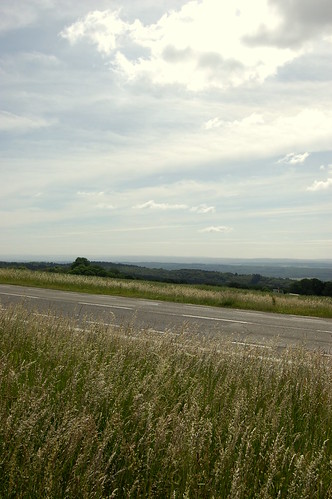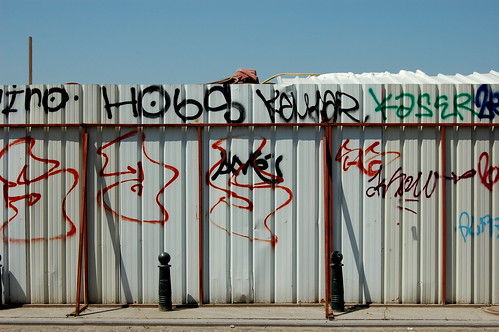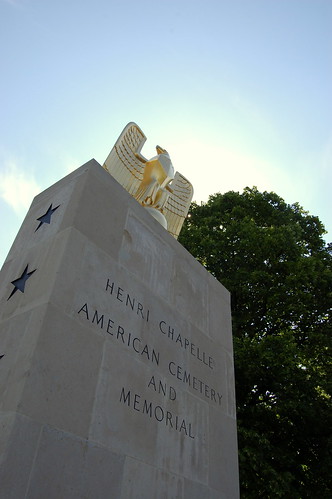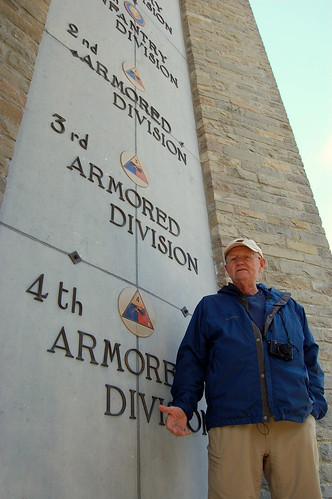Europe Trip
/

I'm finally back from Belgium and caught up with work, rest and a bit of reading to start to put things together on the trip. Short story, Belgium and Germany both rock, while US Airways sucks. A couple of weeks ago, I posted up the sections of the paper that I wrote up, an overview of the Battle of the Bulge and the role that Norwich University students played (note, however, that it's a bit of a work in progress) during the battle.
Seeing a battlefield for one's self, however, puts an entirely new dynamic understanding the battle. Going to Belgium and Germany to look at the lead up to the Bulge, and the Bulge itself, helped me understand a lot, but also showed me where I need to continue to research to make the paper better. That'll likely happen this summer, as I update what I wrote a bit, and write up an article on the 2nd Armored Division for Armchair General.

Flying was a nightmare, and you can read the other post for the specifics - it's not worth remembering, honestly. But, getting into Brussels left me a little time to wander, so I walked a couple of miles from the hotel into the city center (I didn't want to worry about figuring out the bus and train system, and I was impatient). Taking out a map, I noted which streets I went down, and wandered my way over, which is something that I recommend in any foreign city - I did it in London, and in Athens, and I honestly believe that I got a better sense of the city than I otherwise would have. It's a neat place, entirely not what I expected, and a huge contrast from the downtown tourist section.
Meeting up with the group, we had our initial briefing, then set out the next morning to look at the northern advance of the 2nd Armored Division in the months preceding the Bulge, as Norwich had a member, Captain James Burt, who earned the Metal of Honor in Aachen for his actions during a firefight. We looked at several towns in the lead up to that fight, examining some of the logistical problems that would have cropped up, as well as some of the battlefield sites.

One of the parts that always hits the hardest when looking at battlefields is looking at the US Cemeteries: they're immaculate, haunting, and stark. We visited the Henri Chappelle American Cemetery and Memorial, where we discovered the final resting place of a Norwich Alum, Arnold McKerer, a 2nd Lieutenant from the 9th Infantry Division who was killed the day after he was deployed to Monschau. It was sobering, and drove a couple of points home: our institution had a real stake in the battle, and this was a tangible result.
Monschau was lovely: an ancient town, set in a valley, with traditional, German looking structures, a castle on one side, and some ruins on the other. I set out away from the group again and walked around the streets, covering most of it in the couple of hours that we had. It felt very touristy in some places, although it was gratifying to see that there were also German tourists there. I bought an wooden whistle for my dad, in the shape of an owl, then hiked up to the top to the Castle, and then to the ruins.

Monday, we set out from Monchau to look at the opening moments of the Bulge attack. Hitler and his forces achieved near complete surprise in their attack against the allies, which resulted in the near destruction of the 28th and 106th Infantry Divisions. This was in a heavily wooded section of the country, where there was limited mobility, units that were resting from hard combat and new to the front lines. As we drove to the first sites, we saw the remains of the Siegfried Line, dragon's teeth fortifications that were designed to stop an invasion. It's astonishing that they're still there, a pointed reminder of the war and Hitler's legacy.
Going into the woods was eerie. The temperature dropped a couple of degrees, and there's a peaceful calm feel to the woods. The trees are planed in lines, shooting straight to the sky. We could hear birds, owls and the wind as we walked to a monument to the 99th Infantry Division, the unit that fought in that area, as well as the Volksgrenadier Division that was also there. Moving in deeper, we came across the remains of the trenches and foxholes that the allies had dug in place, and listened to some discussion of life in the trenches. Such a violent past felt very out of place in those woods.

From there, we moved further West, towards St. Vith, and looked at the surrounding territory, and the intentions of the German military as they swept inwards. We had a couple of Norwich students perish in this area. Another stand saw more foxholes. We climbed out of the valleys and up into the high ground to the north of the section, where the 82nd Airborne Division held territory, before turning in for the night at Bastogne.
Tuesday, we focused extensively on the 2nd Armored Division, driving out to the western sections of the battlefield, 'classic tank country', according to our guides, BG (RET) Hal Nelson and MG (RET) Gordon Sullivan. Norwich University had focused on cavalry training early on, and we had a number of students present in the ranks, including the general, Ernest Harmon, who would eventually become the university's president in the post-war years. There were several key towns that we looked at that saw some major actions from our soldiers there, who worked to cut off the German advance, and stopping it in its tracks. I could spend an entire week there, looking at that, I think.

The last day, Wednesday, we stayed in Bastogne, where we drove out to the memorial, a towering star-shaped structure that spells out the actions of the bulge. It's an impressive memorial, one that would be a good place to stop to get a good overview of the battle. We didn't look much at Bastogne, but we saw where the significance came from, and the actions that the US 101st Airborne and 10th Armored Division played in helping hold the ground. From there, it was back to Brussels, where we had our final briefing and dinner, then departed for the night. I spend the next two days trying to get home, but ultimately, the trip was worth the trouble. I want to go back to that territory: it's gorgeous out there, with a fascinating role in the 2nd World War.
